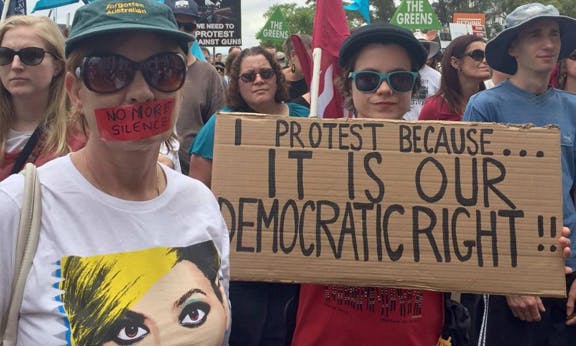More new laws ban protest

A trend is emerging in Australia. Governments are criminalising protest with growing fervour.
Since the “war on terror” began in 2001, the Australian parliament has passed more than 200 new laws that restrict civil liberties. A focus on restricting protest has accelerated in recent years and has become increasingly explicit in its aim: the protection of profit.
The laws that have the widest scope are those passed in Tasmania in 2014. The Workplaces (Protection from Protesters) Act criminalises any activity that “hinders” business activity “for the purposes of promoting awareness of or support for an opinion, or belief, in respect of a political, environmental, social, cultural or economic issue”.
In tabling the legislation in parliament, then minister for resources Paul Harriss said: “The central objective of the government is to ensure wealth creating businesses can develop and grow free from disruptive protest action”.
He went on to state that the bill was specifically motivated by the government’s aim to protect the mining and forestry industries in the state. Developments in Tasmania did not go unnoticed by other sections of business.
The government will … increase penalties for protesters who break into mining operations, damage equipment or disrupt work. – Mike BairdWriting in the Australian on 14 April 2014, Stephen Galilee, chief executive of the NSW Minerals Council, said the government needs to “get tough too” in NSW. “Governments cannot sit idly by and allow these reckless attacks on our economy to go unanswered … Where the laws are inadequate they should be strengthened”, he demanded.
This clarion call to protect the mining industry did not go unanswered. Speaking to representatives of the mining industry in the lead-up to the 2015 NSW election, Mike Baird promised, “[T]he government will … increase penalties for protesters who break into mining operations, damage equipment or disrupt work”. Since being returned to government, he has done so.
Legislation recently passed in NSW extends police search and seizure powers “to deal with people who intend to ‘lock-on’ to equipment or structures for the purpose of interfering with a business or undertaking”. It significantly increases existing penalties for a range of civil disobedience tactics and gives police the power to shut down protest that interferes with traffic.
Hugh de Kretser, executive director of the Human Rights Law Centre, described the NSW laws as “harsh” and “unnecessary”. “Governments across Australia are eroding some of the vital foundations of our democracy, to entrench their own power and that of vested business interests”, he said in a statement.
While the new laws in NSW appear primarily directed at environmental protesters, the deliberately vague language of the legislation may have more far reaching implications. Unions NSW has warned that amendments to existing laws “make it an offence for anyone to interfere with a business on enclosed lands. This could extend to employees taking part in industrial action or union organisers visiting members at their workplaces”.
In Western Australia, similar concerns have been raised about extreme new laws being proposed by the state Liberal government. The legislation would create new offences such as “physically preventing a lawful activity” and “possessing a thing for the purpose of preventing a lawful activity”. The laws would also reverse the burden of proof, requiring that accused protesters overcome a legal presumption that their actions were in breach of the law.
In February, the United Nations High Commissioner for Human Rights issued a statement condemning the proposed laws, which “would result in criminalising lawful protest and silencing environmentalists and human right defenders”. The UN special rapporteur on freedom of expression, David Kaye, said that the laws “would have the chilling effect of silencing dissenters”.
With these types of laws increasingly finding their way on to the books, this is exactly the point.